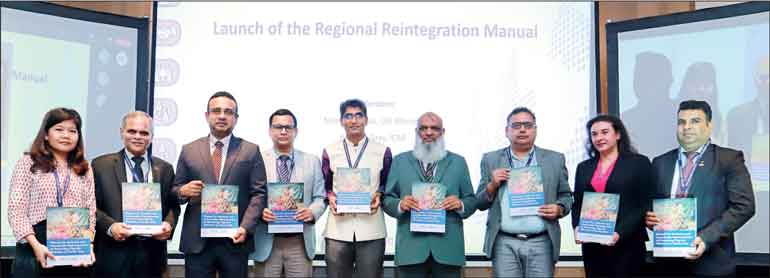Monday Feb 16, 2026
Monday Feb 16, 2026
Friday, 22 December 2023 00:10 - - {{hitsCtrl.values.hits}}


Representatives from 11 Colombo Process Member States participated in the event and observers from civil society, the private sector, trade unions, academia, SDC, the UN agencies
Under the leadership of the Government of Sri Lanka, the regional consultative process on overseas employment and contractual labour for countries of origin in Asia; the Colombo Process held its Thematic Area Working Group Meetings (TAWGs) from 12 to 14 December, bringing together representatives from 11 Colombo Process Member States and civil society as well as the UN agencies among others.
IOM continues to provide technical and administrative support to the Colombo Process, since its establishment in 2003.
The event included a combined meeting of three TAWGs, namely Skills and Qualifications Recognition (S&Q), the Cheaper, Faster and Safer Transfer of Remittances (Remittances), and Fair and Ethical Recruitment Practices (FERP), as well as a Reintegration Knowledge Forum.
Welcoming all participants, Minister of Labour and Foreign Employment Manusha Nanayakkara commended the achievements of Governance of Labour Migration in South and South-East Asia (GOALS), a joint regional program between the International organisation for Migration (IOM), International Labour organisation (ILO) and UN Women, for strengthening the Colombo Process and related working groups.
Meanwhile, Ambassador of Switzerland to Sri Lanka Siri Walt stated, “The Swiss Agency for Development and Cooperation (SDC) has been supporting the Colombo Process since 2014. Switzerland appreciates the efforts of the Colombo Process in setting the benchmark for policy dialogue in the regional context of increasing migration flows and a growing number of complex challenges.”
In the S&Q meeting chaired by Sri Lanka, Ministry of Labour and Foreign Employment Secretary Ananda Wimalaweera highlighted the efforts of the member states in improving the skills and qualifications of migrant workers to negotiate higher benefits. Moderating the session on migrant workers’ remittances, the Government of Pakistan placed the discussion focus on measures to improve access to safe and regular channels of fund transfer, with a particular emphasis on the protection for low-skilled migrant workers and strategies to increase their financial literacy.
Following the TAWGs meeting, the Reintegration Knowledge Forum coincided with the launch of the Regional Reintegration Manual for South Asian Migrant workers produced by IOM and UN Women. The manual was presented to the Governments of Sri Lanka, Bangladesh, India, Nepal and Pakistan. Throughout the Forum, a statement of support for the principles of the Manual was also endorsed.
“Pre-departure skills development has been a focus for IOM and ILO. On the other hand, the COVID-19 pandemic amplified the need for better reintegration assistance with skilling, re-skilling and upskilling of workers. It is clear that a reintegration action plan is needed in Sri Lanka, and IOM is honoured to assist in the finalisation of its framework,” said IOM Chief of Mission in Sri Lanka and the Maldives Sarat Dash.
The meetings concluded with the final recommendations of the TAWGs to be presented to the ministerial and senior officials of the member states.